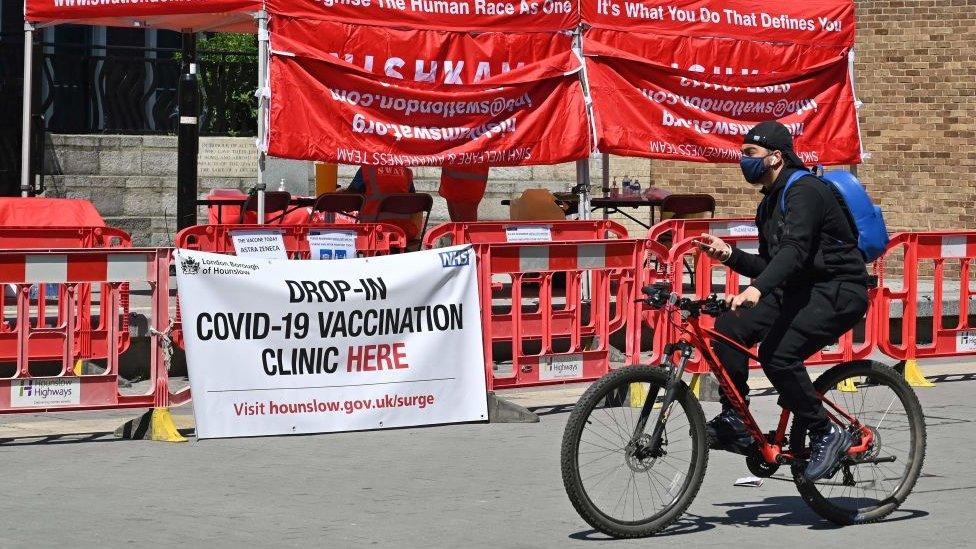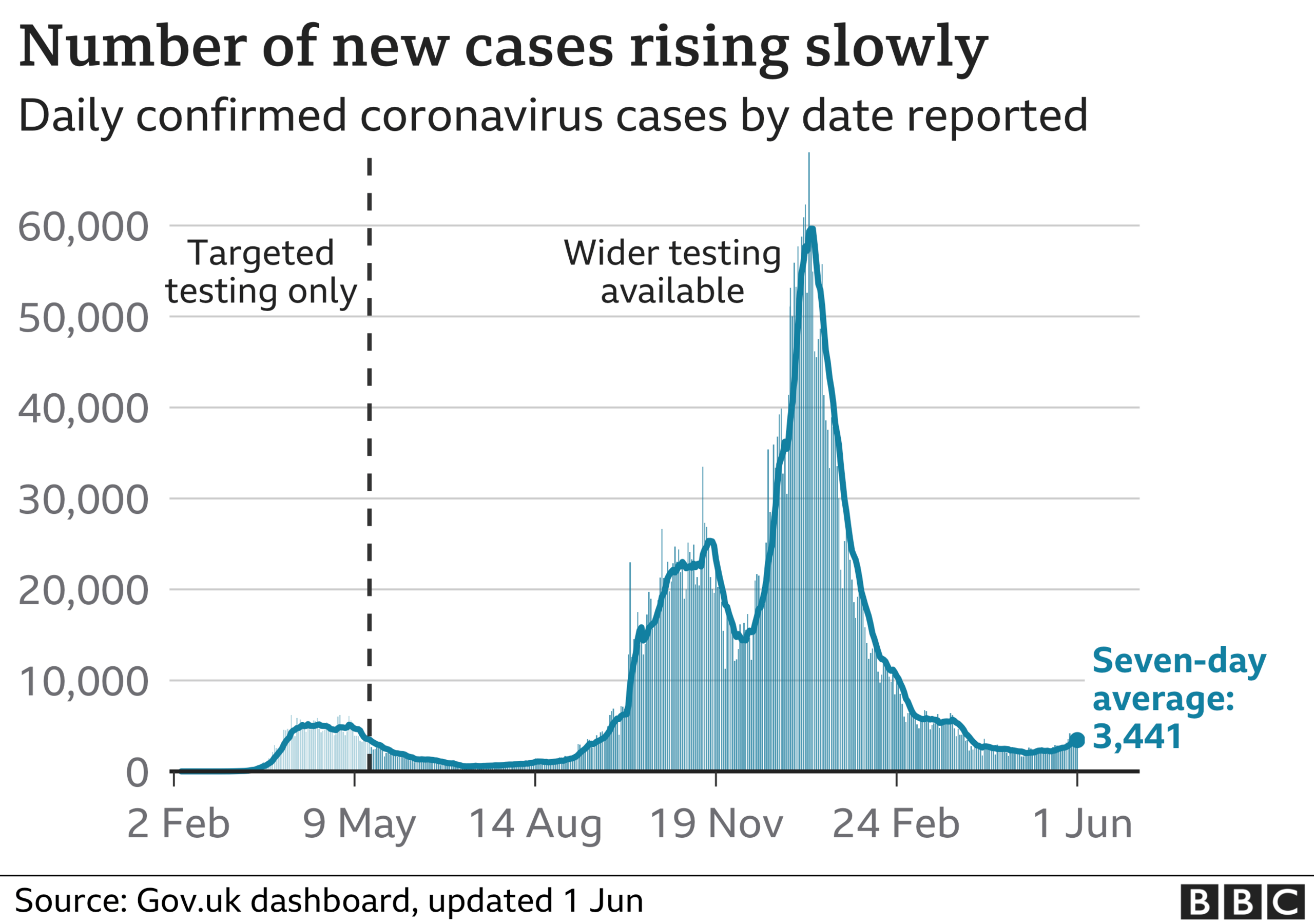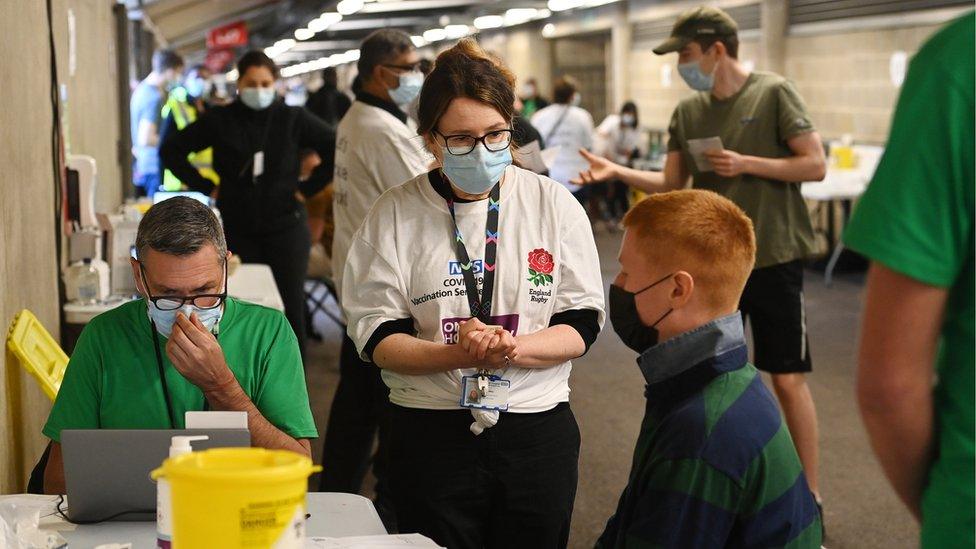Covid-19: UK's data encouraging, says government adviser
- Published
- comments

The UK's latest coronavirus data looks encouraging, a government adviser has said, amid a debate over whether to end restrictions in England on 21 June.
Sir John Bell, part of the government's vaccine taskforce, said there needed to be "balance" to the discussion.
On Tuesday the UK announced zero Covid deaths for the first time since the pandemic began.
The PM has reiterated that nothing in the data suggested the next stage of lifting lockdown could not go ahead.
Speaking on Wednesday, Boris Johnson said he remained cautious as it was unclear how protected the population would be against a new surge.
He said data on that was "still ambiguous" and scientists needed longer to look at it.
"I'm sorry that's frustrating for people, I know that people want a clear answer about the way ahead for 21 June but at the moment we have just got to wait a little bit longer," he said.
Health Secretary Matt Hancock added there was nothing in the data to suggest the UK was "definitively off track".
He also said three in four UK adults had now received one dose of a coronavirus vaccine.
The debate about whether or not to end restrictions on 21 June is linked to concern over a recent rise in cases and the spread of the more transmissible variant first identified in India, now known as Delta.
The UK recorded a further 4,330 infections on Wednesday and another 12 deaths within 28 days of a positive test.
The rise in cases has led some scientists to suggest a delay to the last stage of the government's roadmap in England for lifting lockdown, which would remove all legal limits on how many people you can meet.
A final decision on whether restrictions will be relaxed will be reached on 14 June.
Sir John, regius professor of medicine at University of Oxford, told BBC Radio 4's Today programme that the UK's "numbers don't look too intimidating" and he was "encouraged" by what he saw.
However, he said the government was taking "a wise approach" in being cautious ahead of making its decision.
"I do think we need to keep our eye on hospitalisations, serious disease and deaths which is really what we are trying to manage," he said.
"If we scamper down a rabbit hole every time we see a new variant we are going to spend a long time huddled away so we do need to keep a bit of balance to the discussion and keep our eyes on the serious disease that we are trying to prevent."
The timetable for relaxing Covid measures varies across the UK.
In Wales, the health minister has said the easing of restrictions - due to be reviewed on Thursday - could be affected by a "very serious" cluster of the Delta variant in Conwy county.
It comes a day after the relaxing of measures in Scotland was paused for millions of people in areas where cases have been rising.
In Northern Ireland, some restrictions were lifted on 24 May - the next review is due on 10 June.

The UK has now reported more than 3,000 new coronavirus infections for seven days in a row,, external but hospital admissions remain below 1,000 - compared to nearly 40,000 during January's peak.
Latest data from the Office for National Statistics (ONS) showed the number of weekly Covid deaths was at its lowest level since September.
The number of deaths registered in the week ending 21 May was 115 - 49 fewer than the previous week and the lowest since 83 were reported for the week ending 4 September.
The NHS Confederation, which represents health and care leaders, said the ONS figures were reassuring but "the race is not yet won".
Dr Layla McCay, director of policy, said: "It is of real concern that cases are climbing quickly, and our members are increasingly worried that this will lead to more hospital admissions."

A SIMPLE GUIDE: How do I protect myself?
AVOIDING CONTACT: The rules on self-isolation and exercise
WHAT WE DON'T KNOW How to understand the death toll
LOOK-UP TOOL: Check cases in your area

Industry leaders have warned that any change to the proposed dates for relaxing lockdown measures would be devastating for businesses.
The UK Weddings Taskforce, which was set up during the pandemic to represent the sector, said 50,000 ceremonies were expected to take place in the month after 21 June and any delay could cost the weddings industry hundreds of millions of pounds.
Sarah Haywood, from the UK Weddings Taskforce, told BBC Radio 5 Live that all she saw was scientists saying they might need to wait a bit longer but "how much longer and for what".
"It's preposterous for the government to suggest that the wedding sector can't be trusted to work in a Covid-secure way," she said.

DO BLACK LIVES STILL MATTER?: Investigating what's really changed one year after the death of George Floyd
ARE YOU SCARED YET?: Panorama investigates how AI has changed our world and the risks that come with it

Related topics
- Published1 June 2021
